(Click the blue text above to quickly follow us)
Translation: Bole Online – Ai Lingfeng, English: Steve Emms
If you have good articles to submit, please click → here for details
Books are very personal items, and programming books are no exception. We all use books to help master the basic knowledge of a language. Then we explore the flexibility of that language through further reading. I have carefully examined some of my favorite C language books and selected nine that have been most meaningful to me.
The C language is a general-purpose, procedural high-level programming language. It is also one of the most popular and influential programming languages. The language was designed to be compiled by a compiler, allowing for low-level memory operations, efficient execution of machine instructions, and minimal runtime support. Many programming languages benefit from C, making it a universal language in the programming world.
The C language is very understandable. It allows programmers to organize programs in a clear, simple, and logical manner. It is a very flexible, practical, and concise language, with a syntax that is easy to read. Code written in C runs very quickly and can easily manipulate the underlying facilities of the computer. Compiler directives allow us to generate the same version of a program for devices with different architectures.
The C language is free. Therefore, books that teach C language also reflect this freedom. Come and see the open-source books I have selected; perhaps one will attract you! Enjoy!
The C Book (The C Book)
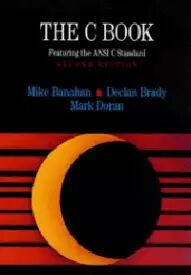
Authors: Mike Banahan, Declan Brady, and Mark Doran, 350 pages
This book is designed for programmers who already have experience with modern high-level procedural programming languages. It focuses on the unique aspects of the C language, particularly the ways of using C.
Includes the following chapters:
-
Introduction to Variables and Operators – Covers the basics of C language, including keywords and identifiers, variable declarations, real types, integers, expressions and operators, and constants.
-
Control Flow and Logical Expressions – This chapter introduces several methods that can be used to control program flow in C, including some statements not yet covered. Control flow, logical expressions, and unusual operators.
-
Functions – Types of functions, recursion, parameter passing, and linking.
-
Arrays and Pointers – Arrays, pointers, character handling, sizeof, memory allocation, function pointers, expressions containing pointers, arrays,
&operator, and function declarations. -
Struct Data Types – Structures, unions, bit fields, enumerated types, qualifiers, derived types, and initialization.
-
Preprocessor – How the preprocessor works and its related directives.
-
Specifics in C Language – Declarations, definitions,
typedef,const,volatile, and sequence points. -
Libraries – Diagnostics, character handling, localization, implementation-specific limitations, mathematical functions, non-local jumps, signal handling, variable arguments, input/output, formatted I/O, character I/O, unformatted I/O, random access functions, generic functions, string handling, date and time.
-
Complete Programs Written in C – Integrating the above content, parameters of the main function, parsing program parameters, pattern matching programs, and a more complex program.
The author allows readers to do anything they want with this book, as long as they credit the author and copyright. Confirmed by Mike Banahan, this book is published under a Creative Commons license.
C Elements of Style (C Elements of Style)
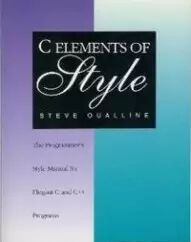
Author: Steve Oualline, 265 pages
This is a very useful programming style guide that instructs C and C++ programmers on how to write readable, understandable, and maintainable programs. Whether you are a student or a professional programmer, you can benefit from the tips and techniques provided in this book to build elegant and reliable code.
This book aims to show readers how to incorporate well-styled code into their programs. Machines only process code, while humans focus on comments. Good programming style relates to both aspects.
Our ultimate goal is to construct well-designed, well-written code that is efficient for computers while containing carefully crafted comments to help humans understand the program. This makes debugging, maintaining, and enhancing the program much easier, ultimately improving the code’s readability, conciseness, reliability, and maintainability.
In this book, you can find guidelines on writing comments, program headers, variable naming, statement formatting, statement details, writing preprocessor commands, organizing directories, and creating makefiles.
This book is published under a Creative Commons license.
Build Your Own Lisp (Build Your Own Lisp)
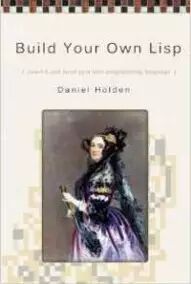
Author: Daniel Holden, 212 pages
Learn how to create your own programming language—a minimal Lisp language (in less than 1000 lines of code) while learning C.
This book is written for two types of people: those who want to learn C and those who want to know how to create a language. This book is not suitable as a first introductory book, as you need some programming experience to understand its content.
This book is published under the Creative Commons Attribution-NonCommercial-ShareAlike 3.0 license.
The print version is available for purchase on Amazon.
The GNU C Reference Manual (The GNU C Reference Manual)
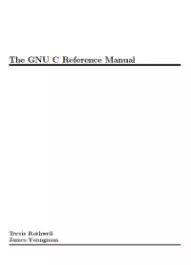
Authors: Trevis Rothwell, James Youngman, 91 pages
This book is a reference manual for the C language, intended to clarify the C89, C99 standards, and the current GNU extensions to standard C. This book is not suitable for beginners.
Includes the following chapters:
-
Lexical Elements – This section describes the lexical elements that make up C language code after preprocessing. It includes five types: keywords, identifiers, constants, operators, and delimiters.
-
Data Types – Studies basic data types, enumerations, unions, structures, arrays, pointers, incomplete types, type qualifiers, storage type qualifiers, and renamed types.
-
Expressions and Operators – Also introduces increment/decrement, arithmetic operators, complex conjugates, comparison operators, logical operators, shifts, bitwise operators, pointer operators,
sizeof, type conversions, etc. -
Statements – Labels, expressions,
ifstatements,switchstatements,whilestatements,dostatements,forstatements, code blocks,nullstatements,gotostatements,breakstatements,continuestatements,returnstatements, andtypedefstatements. -
Functions – Learn about function declarations, definitions, calls, parameters, variable-length parameter lists, calling functions via pointers,
mainfunction, recursive functions, etc. -
Program Structure and Scope – A macro view of the program.
-
An Example – A complete program written in C, including C source files and header files. This program is an extended version of a typical “hello world” program, demonstrating how C works in the GNU FSF project.
This book is published under the GNU Free Documentation License Version 1.3 and its later versions.
The GNU C Programming Tutorial (The GNU C Programming Tutorial)
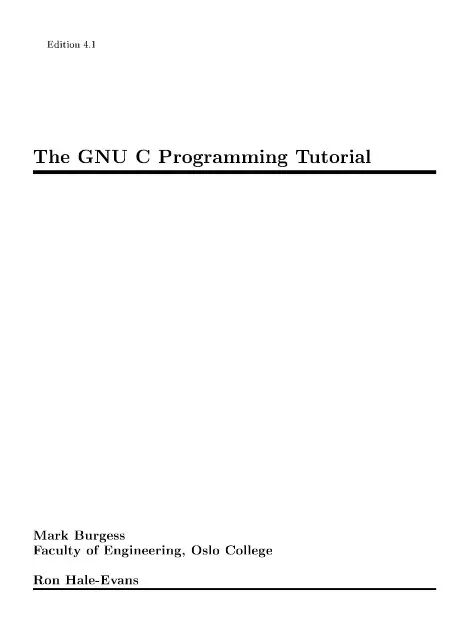
Authors: Mark Burgess, Ron Hale-Evans, 290 pages
This book introduces the basic content of the C language in a logical order. It covers all the main details of the C language and how to program in C, with a particular emphasis on the GNU/Linux compiler and related software.
Some chapters mainly cover functions, variables and declarations, scope, expressions and operators, parameters, pointers, conditions, loops, arrays, strings, input/output, etc.
This book is published under the GNU Free Documentation License Version 1.1.
Essential C (Essential C)
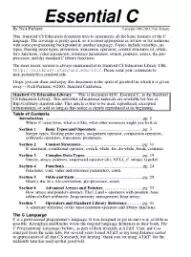
Author: Nick Parlante, 45 pages
This brief document explains all the common features and techniques of the C language. It is very concise, targeting an audience that already has a background in other programming languages.
Content includes variables, integers, floating-point types, type promotion, truncation, operators, control structures (if, while, for), functions, numeric parameters, reference parameters, structures, pointers, arrays, preprocessor, and C standard library functions.
Table of contents:
-
Introduction
-
Basic Types and Operators
-
Control Structures
-
Complex Data Types
-
Functions
-
Miscellaneous
-
Advanced Arrays and Pointers
-
Operators and Standard Library
According to the author, this is a book published under an open-source license.
Beej’s Guide to C Programming (Beej’s Guide to C Programming)
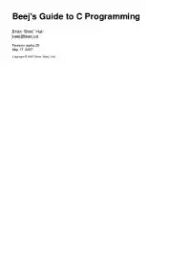
Author: Brian “Beej” Hall, 130 pages
This book attempts to bring a sense of joy that can only be derived from pure C programming to confused readers.
Chapters:
-
Basic building blocks of program structure
-
Variables, expressions, and statements. A variable is a name for a number—a C expression can contain other expressions and operators. The article also introduces
if,while,do while, and theforstatement for repeating programs.
-
Functions—When program blocks become large or are used to perform specific tasks, we encapsulate them into functions.
-
Variables (continued)—Explores variable scope and storage types.
-
Pointers—They are the addresses of data in memory. Just as an integer value can be 12, a pointer’s value is the address of data in memory.
-
Structures—Structures allow you to group logically related variables, which you can then use as a whole.
-
Arrays—A linear collection of related data.
-
Strings—In C, a string is a contiguous set of bits in memory that contains a set of characters.
-
Dynamic Memory—Explores the functions malloc(), free(), realloc(), and calloc().
-
More Content—Pointer arithmetic,
typedef, enumerations, structure declarations, command-line parameters, multi-dimensional arrays, type conversions and promotions, incomplete types,voidpointers,NULLpointers, and thestatickeyword. -
Standard Input/Output Library—Used for reading and writing files.
-
String Operations—Functions for finding substrings, concatenating strings, getting string lengths, etc.
-
Arithmetic—Some functions to meet your basic arithmetic needs.
This book is published under the Creative Commons Attribution-Noncommercial- No Derivative Works 3.0 license.
Modern C (Modern C)
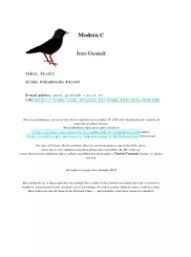
Author: Jens Gustedt, 310 pages
This book encourages readers to explore the features of the C language step by step. The content is divided into five levels:
-
Level One—Familiarize readers with the most basic C language programs. Understand the purpose of using C and data structures, and how to use them.
-
Level Two—Detailed explanations of most major concepts and features, including control structures, data types, operators, and functions. The main goal of this level is to provide readers with a deeper understanding of the essential knowledge required to run programs.
-
Level Three—Delve into the core of the C language. Detailed explanations of pointers, familiarizing you with the C language’s memory model, and understanding the interfaces of most C language libraries.
-
Level Four—In-depth understanding of specific topics, such as performance, reentrancy, atomicity, threads, and generic programming.
-
Level Five—Explores the author’s understanding of the future development trends of the language.
This book is published under the Creative Commons Attribution-Noncommercial- No Derivative Works 3.0 license.
An Introduction to GCC (An Introduction to GCC)
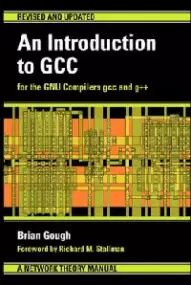
Author: Brian Gough, 144 pages
This book introduces the GNU C and C++ compilers—gcc and g++, which are part of the GNU Compiler Collection (GCC).
This book explains how to use the compiler. Based on years of observing questions in mailing lists, this book guides readers to the important aspects of GCC.
Chapter Overview:
-
Compiling C Programs—Introduces how to use gcc to compile C programs. Both single files and multiple files can be compiled, and operating system functions and header files can also be used.
-
Compilation Options—Introduces some common compilation options in gcc. These parameters control various functions, such as searching for library functions and header file paths, providing additional compilation warnings and diagnostics, preprocessor macros, and C language dialects.
-
Using the Preprocessor—Describes how to use cpp (GNU C preprocessor), which is part of GCC. The preprocessor expands macros in the code before compilation, and it is automatically invoked when GCC processes C or C++ code.
-
Compiling Programs with Debug Information—Provides a
-goption to store additional debugging information in intermediate files and executable files. This debugging information allows us to trace errors back to the source code. -
Optimizing Compilation—GCC is an optimized compiler. It offers many options to speed up compilation or reduce the size of compiled files.
-
Compiling C++ Programs—Introduces how to use GCC to compile C++ programs and the command-line options available for that language.
-
Platform-Specific Options—Introduces options available for common platforms.
-
Debugging—GCC provides several help and diagnostic options to assist us in locating issues during the compilation process.
-
Compiler-Related Tools—Introduces some useful tools used during the GCC compilation process, including the GNU archiving tool ar, GNU profiling and coverage testing programs gprof and gcov.
-
How the Compiler Works—A detailed explanation of how GCC compiles source files into executable files. Compilation is a multi-stage process involving many tools, including the GNU compiler itself, the GNU assembler, and the GNU linker. The various tools used during the compilation process are collectively referred to as the compilation chain.
-
Checking Compiled Files—Introduces some tools for checking the contents of executable files and object files.
-
Common Error Messages—Introduces the most common errors and warning messages produced by gcc and g++. Each case includes an analysis of the cause, examples, and suggested solutions.
-
Getting Help—If readers encounter issues not mentioned in the book, there are many manuals available that introduce GCC and the language.
This book is published under the GNU Free Documentation License.
Many C language books are available for free download, but unfortunately, they are not published under open-source licenses, or their licensing is not clearly stated. Below are some introductions, listed in no particular order:
-
Introduction to C Programming – Author: Rob Miles
-
The New Standard C: An Economic and Cultural Commentary – Author: Derek M. Jones
-
Object-Oriented Programming with ANSI-C – Author: Axel-Tobias Schreiner
-
Writing Bug-Free C Code – Author: Jerry Jongenius
Finally, if you want to buy an authoritative reference book, be sure to get The C Programming Language (The C Programming Language). This book is very concise and not suitable for beginners, but it is regarded as a classic.
WeChat does not support external links, click “Read the original text” to jump to view the corresponding open-source book links.
If you find this article helpful, please share it with more people.
Follow “CPP Developers”
See more selected C/C++ technical articles.
